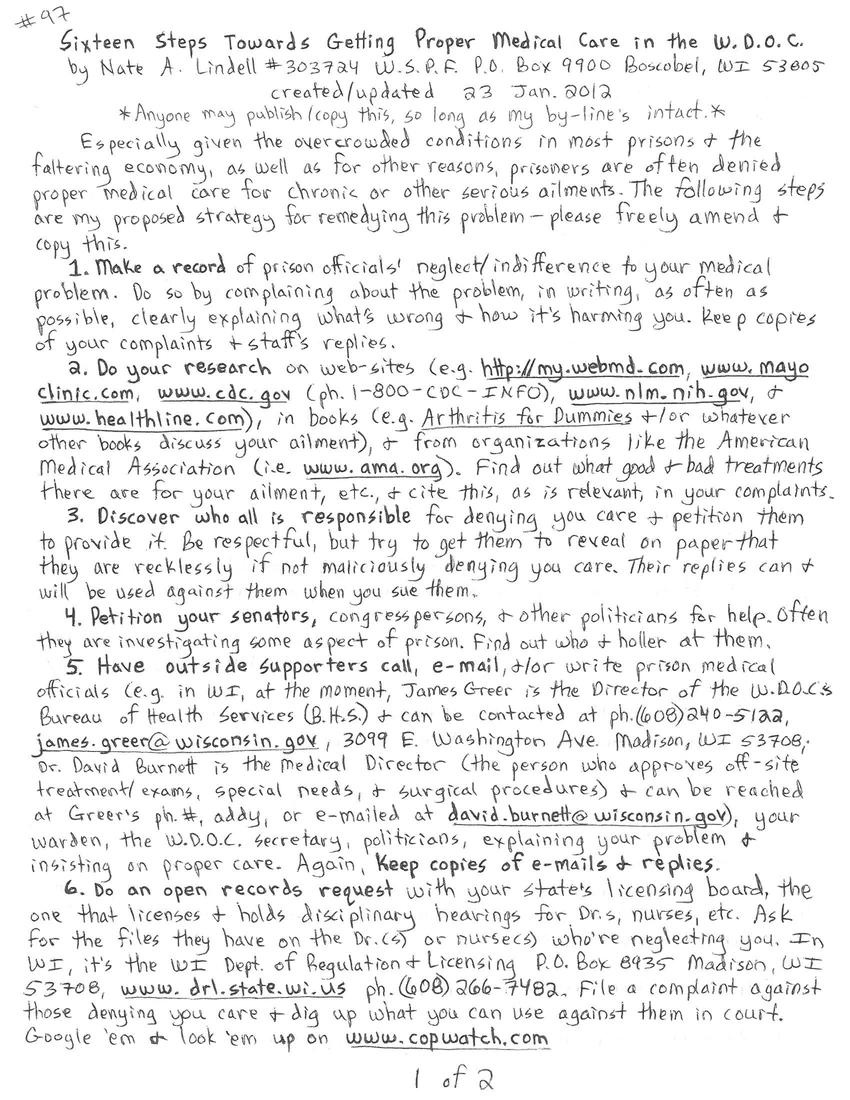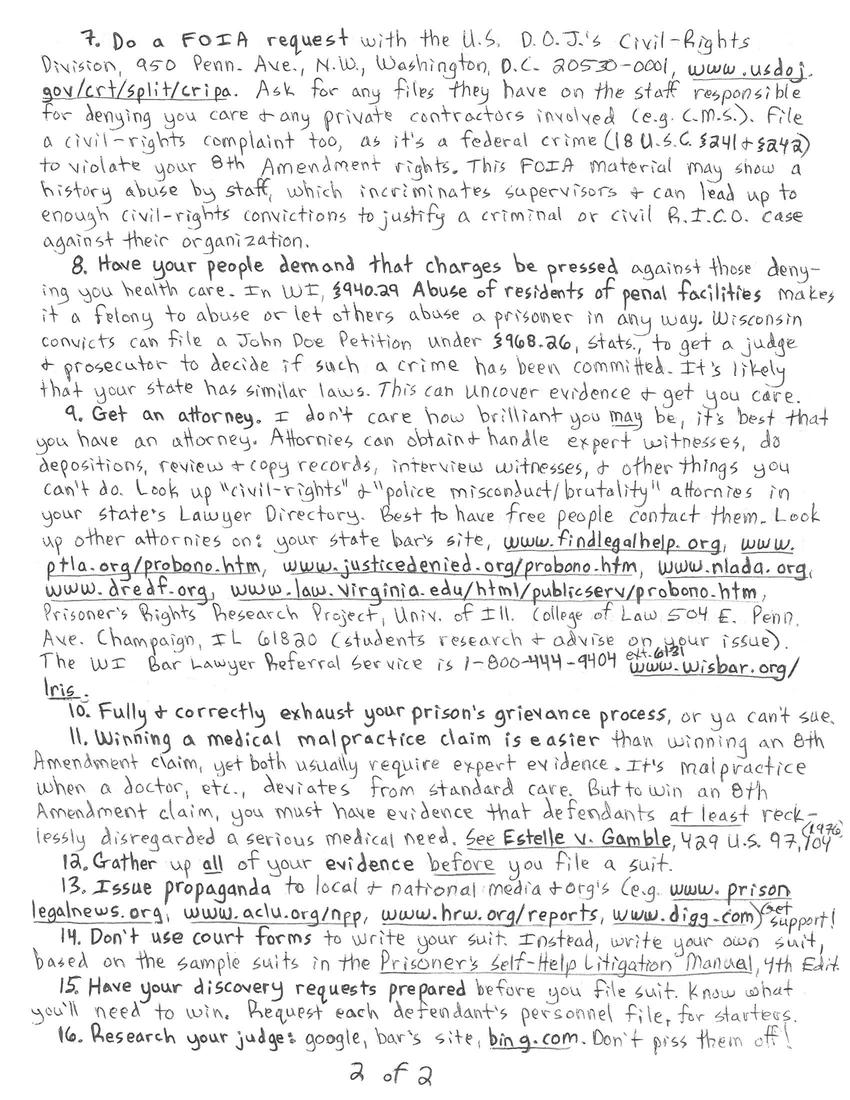
Transcription
#97
Sixteen Steps Towards Getting Proper Medical Care in the W.D.O.C. by Nate A. Lindell #303724 W.S.P.F. PO Box 9900 Boscobel, WI 53005
created/updated 23 Jan 2012
*Anyone may publish/copy this so long as my by-line's intact.*
Especially given the overcrowded conditions in most prisons + the faltering economy, as well as for other reasons, prisoners are often denied proper medical care for chronic or other serious ailments. The following steps are my proposed strategy for remedying this problem - please freely amend + copy this.
1) Make a record of prison officials' neglect/indifference to your medical problem. Do so by complaining about the problem, in writing, as often as possible, clearly explaining what's wrong + hoe it's harming you. Keep copies of your complaints + staff replies.
2) Do your research on web-sites (e.g. http://my.webmd.com, www.mayoclinic.com, www.cdc.gov (ph. 1-800-CDC-INFO) www.nlm.nih.gov or www.healthline.com), in books (e.g. Arthritis for Dummies +/or whatever other books discuss your ailment) + from organisations like the American Medical Association (i.e. www.ama.org). Find out what good and bad treatments there are for your ailment, etc + cite this, as it is relevant in your complaints.
3) Discover who all is responsible for denying you care + petition them to provide it. Be respectful, but try to get them to reveal on paper that they are recklessly if not maliciously denying you care. Their replies can + will be used against them when you sue them.
4) Petition your senators, congresspersons + other politicians for help. Often they are investigating some aspect of prison. Find out who + holler at them.
5) Have outside supporters call, e-mail +/or write prison medical officials (e.g. in WI, at the moment, James Greer is the Director of the W.D.O.C.s Bureau of Heath Services (BHS) + can be contacted at ph. (608) 240-5122, james.green@wisconsin.gov, 3099 E Washington Ave. Madison, WI 53708; Dr David Burnett is the medical director (the person who approves off-site treatment/exams, special needs + surgical procedures) + can be reached at Greer's ph #addy, or e-mailed at david.burnett@wisconsin.gov), your warden, the W.D.O.C. secretary, politicians, explaining your problem + insisting on proper care. Again, keep copied of e-mails + replies.
6) Do an open records request with your state's licensing board, the one that licenses + holds disciplinary hearings for Drs, nurses etc. Ask for the files they have on the Dr(s) or nurse(s) who're neglecting you. In WI, it's the WI Dept. of Regulation + Licensing PO Box 8935 Madison, WI 53708, www.drl.state.wi.us ph (608) 266-7482. File a complaint against those denying you care + dig up what you can use against them in court. Google 'em + look 'em up on www.copwatch.com.
7) Do a FOIA request with the US DOJ's Civil Rights Division, 950 Penn. Ave, NW, Washington DC, 20530-0001, www.usdoj.gov/crt/split/cripa. Ask for any files they have on the staff responsible for denying you care + any private contractors involved (e.g. CMS). File a civil rights complaint too, as it's a federal crime (18 USC 241+242) to violate your 8th Amendment Rights. This FOIA material may show a history abuse by staff, which incriminates supervisors + can lead up to enough civil-rights convictions to justify a criminal or civil RICO case against their organization.
8) Have your people demand that charges be pressed against those denying you health care. In WI 940.29 Abuse of residents of penal facilities makes it a felony to abuse or let others abuse a prisoner in any way. Wisconsin convicts can file a John Doe Petition under 968.26 stats to get a judge + prosecutor to decide if such a crime has been committed. It's likely that your state has similar laws. This can uncover evidence + get you care.
9) Get an attorney. I don't care how brilliant you may be, it's best that you have an attorney. Attorneys can obtain + handle expert witnesses, do depositions, review and copy records, interview witnesses + other things you can't do. Look up "civil rights" + police misconduct/brutality" attorneys in your state's Lawyer Directory. Best to have free people contact them. Look up other attorneys on: your state bar's site, www.findlegalhelp.org, www.ptla.org/probono.htm, www.justicedenied.org/probono.htm, www.nlada.org, www.dredf.org, www.law.virginia.edu/html/publicserv/probono.htm, Prisoner's Rights Research Project, Univ. of Ill. College of Law 504 E Penn. Ave Champaign, IL 61820 (students research + advise on your issue). The WI Bar Lawyer Referral Service is 1-800-444-9404 ext 6131 www.wisbar.org/iris.
10) Fully + correctly exhaust your prison's grievance process, or ya can't sue.
11) Winning a medical malpractice claim is easier than winning an 8th Amendment claim, yet both usually require expert evidence. It's malpractice when a doctor, etc, deviates from standard care. But to win an 8th Amendment claim, you must have evidence that defendants at least recklessly disregarded a serious medical need. See Estelle v. Gamble 429 US 97,104 (1976)
12) Gather up all of your evidence before you file a suit.
13) Issue propaganda to local + national media + orgs (e.g. www.prisonlegalnews.org, www.aclu.org/npp, www.hrw.org/reports, www.digg.com). Get support!
14) Don't use court forms to write your suit. Instead, write your own suit, based on the sample suits in the Prisoner's Self-Help Litigation Manual, 4th Edition.
15) Have your discovery requests prepared before you file suit. Know what you'll need to win. Request each defendant's personnel file, for starters.
16) Research your judge: google, bar's site, bing.com. Don't piss them off!
Other posts by this author
|
2025 jul 19

|
2025 apr 16

|
2025 mar 3

|
2024 sep 11

|
2024 aug 24

|
2024 aug 20

|
More... |



Replies